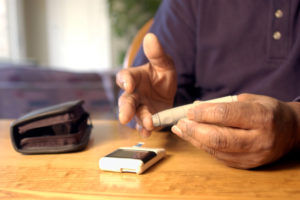 (BlackDoctor.org) — What is diabetes? Essentially, it’s a disorder where your body has problems producing or effectively using insulin, which can, in turn, cause many other mild to severe health problems. There are several different causes of insulin problems – managing your diabetes will depend on which type you have.
(BlackDoctor.org) — What is diabetes? Essentially, it’s a disorder where your body has problems producing or effectively using insulin, which can, in turn, cause many other mild to severe health problems. There are several different causes of insulin problems – managing your diabetes will depend on which type you have.
Types Of Diabetes
Type 1 Diabetes: Little To No Insulin
With type 1 diabetes, which used to be called juvenile diabetes, your body does not produce insulin or produces very little. Type 1 diabetes is known as an autoimmune disease because it occurs when your immune system mistakenly attacks the insulin-producing cells in your pancreas.
Type 1 diabetes usually develops in children and young adults and accounts for 5 to 10 percent of diabetes cases in the United States. Symptoms may include thirst, frequent urination, increased hunger, unexplained weight loss, blurry vision, and fatigue.
People who have type 1 diabetes need to take insulin injections daily to make up for what their pancreas can’t produce.
Type 2 Diabetes: Insulin Resistance
Type 2 diabetes, which used to be called adult-onset diabetes, is the most common form of diabetes, accounting for 90 to 95 percent of diabetes cases. While most people who develop type 2 diabetes are older, the prevalence of type 2 diabetes in children is on the rise.
The exact cause of type 2 diabetes is largely unknown, but the disease tends to develop in people who are obese and physically inactive. People who have a family history of diabetes or a personal history of gestational diabetes are also at increased risk of developing type 2 diabetes. In addition, certain groups, particularly African Americans, have a higher risk of developing type 2 diabetes.
Symptoms of type 2 diabetes usually develop gradually, and are similar to symptoms of type 1 diabetes.
Treatment for type 2 diabetes usually includes dietary changes, regular physical activity, and oral diabetes medications to help control blood glucose. If left untreated, serious health conditions such as heart disease or stroke can develop.
Gestational Diabetes: Pregnancy
Gestational diabetes is a condition that occurs in 3 to 8 percent of pregnant women during late pregnancy. Its cause is thought to be pregnancy-related hormonal fluctuations and a shortage of insulin that often occurs during pregnancy.
Many women with gestational diabetes have no symptoms, so it is important to get screened for this condition during pregnancy. Gestational diabetes can lead to problems such as high-birth-weight babies, breathing problems in the baby, and high blood pressure in the mother during pregnancy. Gestational diabetes is usually treated with dietary changes and exercise, and sometimes insulin injections.
Women who have had gestational diabetes have a 40 to 60 percent chance of developing type 2 diabetes within 5 to 10 years after their pregnancy.
Additional Types of Diabetes
LADA – Latent autoimmune diabetes in adults, or LADA, is a less common form of diabetes that usually affects people over the age of 30. In LADA, initial type 2 diabetes symptoms eventually develop into a condition resembling type 1 diabetes.
People with LADA make enough insulin at first, but their immune system later begins making antibodies against insulin-producing cells of the pancreas. Patients will usually require insulin injections as part of their treatment. It is estimated that up to 10 percent of people with type 2 diabetes have LADA.
Double Diabetes – Double diabetes occurs when someone who already has type 1 diabetes develops a resistance to the insulin medication they are taking, similar to type 2 diabetes. This condition is more and more frequently seen in children, especially those who are overweight or obese.
Diabetes requires careful management to keep blood glucose in check, but specific diabetes treatment plans depend greatly on the types of diabetes – which is why talking with your doctor and identifying what type of diabetes you have is the essential first step.






